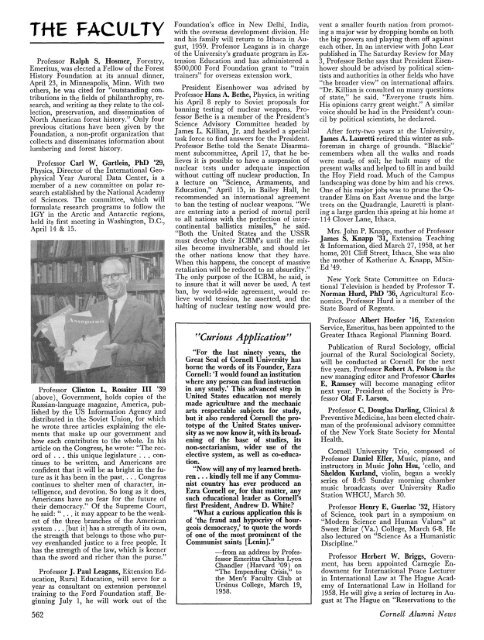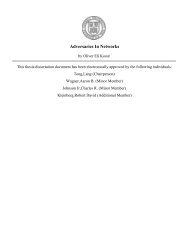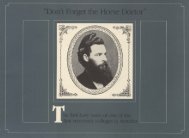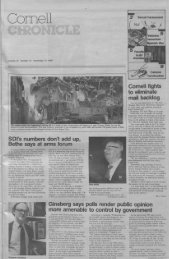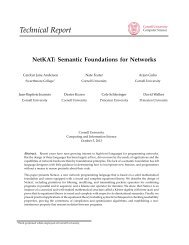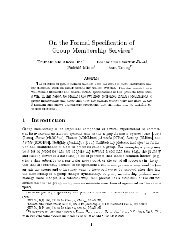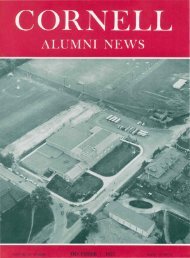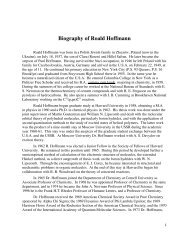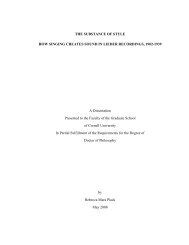\LUMNI NEWS - eCommons@Cornell - Cornell University
\LUMNI NEWS - eCommons@Cornell - Cornell University
\LUMNI NEWS - eCommons@Cornell - Cornell University
You also want an ePaper? Increase the reach of your titles
YUMPU automatically turns print PDFs into web optimized ePapers that Google loves.
THE FACULTY<br />
Professor Ralph S. Hosmer, Forestry,<br />
Emeritus, was elected a Fellow of the Forest<br />
History Foundation at its annual dinner,<br />
April 23, in Minneapolis, Minn. With two<br />
others, he was cited for "outstanding contributions<br />
in the fields of philanthrophy, research,<br />
and writing as they relate to the collection,<br />
preservation, and dissemination of<br />
North American forest history." Only four<br />
previous citations have been given by the<br />
Foundation, a non-profit organization that<br />
collects and disseminates information about<br />
lumbering and forest history.<br />
Professor Carl W. Gartlein, PhD '29,<br />
Physics, Director of the International Geophysical<br />
Year Auroral Data Center, is a<br />
member of a new committee on polar research<br />
established by the National Academy<br />
of Sciences. The committee, which will<br />
formulate research programs to follow the<br />
IGY in the Arctic and Antarctic regions,<br />
held its first meeting in Washington, D.C.,<br />
April 14 & 15.<br />
Professor Clinton L. Rossiter III '39<br />
(above), Government, holds copies of the<br />
Russian-language magazine, America, published<br />
by the US Information Agency and<br />
distributed in the Soviet Union, for which<br />
he wrote three articles explaining the elements<br />
that make up our government and<br />
how each contributes to the whole. In his<br />
article on the Congress, he wrote: "The record<br />
of ... this unique legislature . . . continues<br />
to be written, and Americans are<br />
confident that it will be as bright in the future<br />
as it has been in the past. . . . Congress<br />
continues to shelter men of character, intelligence,<br />
and devotion. So long as it does,<br />
Americans have no fear for the future of<br />
their democracy." Of the Supreme Court,<br />
he said: " . . . it may appear to be the weakest<br />
of the three branches of the American<br />
system . . . [but it] has a strength of its own,<br />
the strength that belongs to those who purvey<br />
evenhanded justice to a free people. It<br />
has the strength of the law, which is keener<br />
than the sword and richer than the purse."<br />
Professor J. Paul Leagans, Extension Education,<br />
Rural Education, will serve for a<br />
year as consultant on extension personnel<br />
training to the Ford Foundation staff. Beginning<br />
July 1, he will work out of the<br />
562<br />
Foundation's office in New Delhi, India,<br />
with the overseas development division. He<br />
and his family will return to Ithaca in August,<br />
1959. Professor Leagans is in charge<br />
of the <strong>University</strong>'s graduate program in Extension<br />
Education and has administered a<br />
$500,000 Ford Foundation grant to "train<br />
trainers" for overseas extension work.<br />
President Eisenhower was advised by<br />
Professor Hans A. Bethe, Physics, in writing<br />
his April 8 reply to Soviet proposals for<br />
banning testing of nuclear weapons. Professor<br />
Bethe is a member of the President's<br />
Science Advisory Committee headed by<br />
James L. Killian, Jr. and headed a special<br />
task force to find answers for the President.<br />
Professor Bethe told the Senate Disarmament<br />
subcommittee, April 17, that he believes<br />
it is possible to have a suspension of<br />
nuclear tests under adequate inspection<br />
without cutting off nuclear production. In<br />
a lecture on "Science, Armaments, and<br />
Education," April 15, in Bailey Hall, he<br />
recommended an international agreement<br />
to ban the testing of nuclear weapons. "We<br />
are entering into a period of mortal peril<br />
to all nations with the perfection of intercontinental<br />
ballistics missiles," he said.<br />
"Both the United States and the USSR<br />
must develop their ICBM's until the missiles<br />
become invulnerable, and should let<br />
the other nations know that they have.<br />
When this happens, the concept of massive<br />
retaliation will be reduced to an absurdity."<br />
The only purpose of the ICBM, he said, is<br />
to insure that it will never be used. A test<br />
ban, by world-wide agreement, would relieve<br />
world tension, he asserted, and the<br />
halting of nuclear testing now would pre-<br />
" Curious Application"<br />
"For the last ninety years, the<br />
Great Seal of <strong>Cornell</strong> <strong>University</strong> has<br />
borne the words of its Founder, Ezra<br />
<strong>Cornell</strong>: Ί would found an institution<br />
where any person can find instruction<br />
in any study.' This advanced step in<br />
United States education not merely<br />
made agriculture and the mechanic<br />
arts respectable subjects for study,<br />
but it also rendered <strong>Cornell</strong> the prototype<br />
of the United States university<br />
as we now know it, with its broadening<br />
of the base of studies, its<br />
non-sectarianism, wider use of the<br />
elective system, as well as co-education.<br />
"Now will any of my learned brethren<br />
. .. kindly tell me if any Communist<br />
country has ever produced an<br />
Ezra <strong>Cornell</strong> or, for that matter, any<br />
such educational leader as <strong>Cornell</strong>'s<br />
first President, Andrew D. White?<br />
"What a curious application this is<br />
of 'the fraud and hypocrisy of bourgeois<br />
democracy,' to quote the words<br />
of one of the most prominent of the<br />
Communist saints [Lenin]."<br />
—from an address by Profesfessor<br />
Emeritus Charles Lyon<br />
Chandler (Harvard '09) on<br />
"The Impending Crisis," to<br />
the Men's Faculty Club at<br />
Ursinus College, March 19,<br />
1958.<br />
vent a smaller fourth nation from promoting<br />
a major war by dropping bombs on both<br />
the big powers and playing them off against<br />
each other. In an interview with John Lear<br />
published in The Saturday Review for May<br />
3, Professor Bethe says that President Eisenhower<br />
should be advised by political scientists<br />
and authorities in other fields who have<br />
"the broader view" on international affairs.<br />
"Dr. Killian is consulted on many questions<br />
of state," he said. "Everyone trusts him.<br />
His opinions carry great weight." A similar<br />
voice should be had in the President's council<br />
by political scientists, he declared.<br />
After forty-two years at the <strong>University</strong>,<br />
James A. Lauretti retired this winter as subforeman<br />
in charge of grounds. "Blackie"<br />
remembers when all the walks and roads<br />
were made of soil; he built many of the<br />
present walks and helped to fill in and build<br />
the Hoy Field road. Much of the Campus<br />
landscaping was done by him and his crews.<br />
One of his major jobs was to prune the Ostrander<br />
Elms on East Avenue and the large<br />
trees on the Quadrangle. Lauretti is planting<br />
a large garden this spring at his home at<br />
114 Clover Lane, Ithaca.<br />
Mrs. John P. Knapp, mother of Professor<br />
James S. Knapp '31, Extension Teaching<br />
& Information, died March 27, 1958, at her<br />
home, 201 Cliff Street, Ithaca. She was also<br />
the mother of Katherine A. Knapp, MSin-<br />
Ed '49.<br />
New York State Committee on Educational<br />
Television is headed by Professor T.<br />
Norman Kurd, PhD '36, Agricultural Economics.<br />
Professor Hurd is a member of the<br />
State Board of Regents.<br />
Professor Albert Hoefer '16, Extension<br />
Service, Emeritus, has been appointed to the<br />
Greater Ithaca Regional Planning Board.<br />
Publication of Rural Sociology, official<br />
journal of the Rural Sociological Society,<br />
will be conducted at <strong>Cornell</strong> for the next<br />
five years. Professor Robert A. Poison is the<br />
new managing editor and Professor Charles<br />
E. Ramsey will become managing editor<br />
next year. President of the Society is Professor<br />
Olaf F. Larson.<br />
Professor C. Douglas Darling, Clinical &<br />
Preventive Medicine, has been elected chairman<br />
of the professional advisory committee<br />
of the New York State Society for Mental<br />
Health.<br />
<strong>Cornell</strong> <strong>University</strong> Trio, composed of<br />
Professor Daniel Eller, Music, piano, and<br />
instructors in Music John Hsu, 'cello, and<br />
Sheldon Kurland, violin, began a weekly<br />
series of 8:45 Sunday morning chamber<br />
music broadcasts over <strong>University</strong> Radio<br />
Station WHCU, March 30.<br />
Professor Henry E. Guerlac '32, History<br />
of Science, took part in a symposium on<br />
"Modern Science and Human Values" at<br />
Sweet Briar (Va.) College, March 6-8. He<br />
also lectured on "Science As a Humanistic<br />
Discipline."<br />
Professor Herbert W. Briggs, Government,<br />
has been appointed Carnegie Endowment<br />
for International Peace Lecturer<br />
in International Law at The Hague Academy<br />
of International Law in Holland for<br />
1958. He will give a series of lectures in August<br />
at The Hague on "Reservations to the<br />
<strong>Cornell</strong> Alumni News


